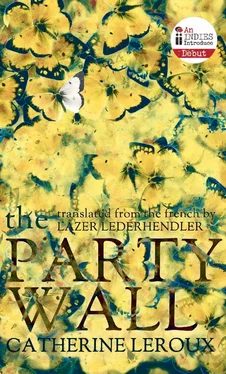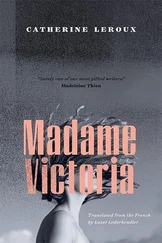He stands in front of her room to listen to her breathing. The breath humans produce when they sleep is prodigious. It dives into the deepest reaches of their being and, upon exhalation, raises the treasures and monsters buried under accumulated crusts of civilization. Dense, troubled, insightful, Marie’s breathing is a masterpiece. To come nearer to it is the only moment of purity available to Ariel from now on. Their physical proximity is always steeped in pain; every surge of desire is accompanied by disgust. Rare and difficult, sex has become the site of a self-loathing equal to their mutual love. But when he looks at her silky arms lying on the sheet, discerning her breast and pubis under the muslin, he is unable to feel regret about anything. One life would not be enough for him to turn Marie into simply a sister.
On other nights he just sits down at his wife’s desk. He holds the pencils between his fingers, leafs through her books, most of them textbooks, a few of them collections of poetry in a dying language; he whiffs the pages that her pointed forefinger has ranged over. Then he rests his cheek on the back of the chair that welcomes Marie’s thoughts day after day. This is how he likes to love her — in her absence, in the imprint that her existence leaves on the night.
In the course of one of these little rituals, he discovers a file folder bearing an accursed name: Eva Volant. For several minutes, Ariel remains stock-still, unable to contain his anger. He was too devastated by the events to say anything when Marie went on her trip to the southern United States. But he continues to disapprove of all efforts aimed at finding their mother. For him, surviving means keeping her out of the picture. How could their so very fragile daily life overcome this strident reminder of their biology? It is already dangerous enough to maintain their love without which they would both be lost; chasing after Eva Volant amounts to juggling with knives.
In the end, he opens the folder and pulls out a sheaf of documents whose cloying smell puts him in mind of the fall floods. He finds the adoption papers, the fateful lines that overturned their lives an eternity ago, it seems to him. Then there are letters and forms testifying to Marie’s investigation, all dated before their move to the Prairies. A considerable sum of work, Ariel sadly acknowledges. Marie was truly determined to resolve the question of their origins.
Under the forms he stumbles on a sheaf of blackened sheets of paper. He brushes his hand over them, leaving his fingers stained with fine soot. Portraits — all different but all alike — in which he recognizes here Marie’s mouth, there her chin, both their eyes, the hair of one of them, the cheekbone of the other, their nose, their forehead, a sharp wrinkle that he might recognize reluctantly, an earlobe suggesting a familiar texture. With small, uncertain touches or broad, desperate strokes, Marie has tried to reconstitute their mother’s face, conjugating all possible combinations. Ariel cannot help thinking that this visual genealogy lacks one essential component: the face of the father. But the thought is too dizzying and he drives it away just as Marie must have with a stroke of charcoal.
He silently returns the papers to their original place in the folder, but not without first pilfering one of the sketches, the simplest one, the one in which Marie dared to put a smile on Eva’s face, an embarrassed smile or possibly the sneer of those who dice with destiny. He folds the portrait and unthinkingly slips it into his wallet, then he picks up his guitar and plays a tune so old it might be telling their story, their mother’s story, the story of all who one day doubted their humanity.
They go to church. It’s impossible to avoid this monument to consensus built during the reform period and therefore afflicted with an architectural style at once unbridled and conventional, somewhere between a temple and a shopping mall — the mandatory style of contemporary believers. They would have preferred to stay neutral with respect to religion, but Marc advised them to swell the Christian ranks and not turn up their noses. In small Prairie communities, suspicion starts with impiety.
They therefore show up each Sunday at the church square and join the assembly of neighbours and colleagues, young soldiers eager for absolution, students and their stubby-nosed, thick-legged parents. Ariel and Marie sit in the back like dunces. The church is the only place where they once again have the feeling they are making an exhibition of themselves. True, they are constantly playing a part, but the part is confined to an alias and a disguise. The rest is far from being as scripted as their life in Montreal and Ottawa. Only in church do they still act in ways that remind them of politics. The right answer at the right moment, standing up and sitting down at the same time as the others, nodding one’s head, giving the appropriate look. As she plays the game and sees Ariel making an effort to remember how to cross himself properly, Marie realizes how intolerable it was for her to play the Prime Minister’s wife.
Fortunately, the pastor is a moderate and his attitude rubs off on his flock. He preaches tolerance, mutual support, modesty. The congregation is not afraid of him, so the nave is suffused with a certain degree of warmth. As a result, Marie and Ariel can manage a few seconds of contemplation, while sharp-angled forms rain down on them like wedges, the slanting shadows of stained glass windows where stylized Jesuses walk on the water and sink for the third time.
The topic of the exercise: “what my name means.” After questioning their family on the subject, the pupils must present, in French, the origin of their given name and surname. With her little feet firmly planted in front of the class, Sophia says that her given name means “wisdom.” Marco talks about his Venetian ancestors and the explorer Marco Polo. Junior admits he was astounded to learn that his first name refers to his father’s, a fact of which he was unaware for the first seven years of his life because during that time he was just called junior . Lastly, Angel explains that she was baptized in honour of an aunt who had met with a serious accident.
Stepping closer to congratulate her for her presentation, Marie notices some oddly shaped black-and-blue marks on Angel’s forearm. In addition, the little girl’s chin is scraped, a wound that Marie had ascribed to an ordinary childhood mishap. During the written exercises, she discreetly tries to get a glimpse of Angel’s knees under her yellow skirt. There, too, the skin appears to be rubbed raw, and Marie suddenly gets the impression Angel’s small chocolate-coloured body is covered with scars. Recalling Ariel’s remarks about Angel’s father, Marie spends two days looking for a way to broach the question with her. She finally decides on the direct approach.
“Angel, sweetheart, you certainly have a lot of bruises!”
Quite unexpectedly, the child breaks into a grin, rolls up her sleeves, and displays her marks as if they were trophies.
“I got them during training! It’s not for wimps!”
“I see! What sport do you play?”
“It’s not a sport. They’re exercises my dad makes me do. To be stronger.”
“Like… like a soldier?”
“Yes. You know, Mrs. Leblanc, we’ve got to be ready for war.”
Marie solemnly nods her head and lets the little girl scamper away. Waiting for Angel outside is Monette Vernon, who lifts her off the ground to kiss her. Under a grey sky, the school buses stir like exhausted dinosaurs; the kids’ small feet stamp on the indifferent ground. Watching the mother and daughter as they move away, Marie slowly brings a piece of chalk to her mouth and bites into it. “And what does my name mean?”
Читать дальше











